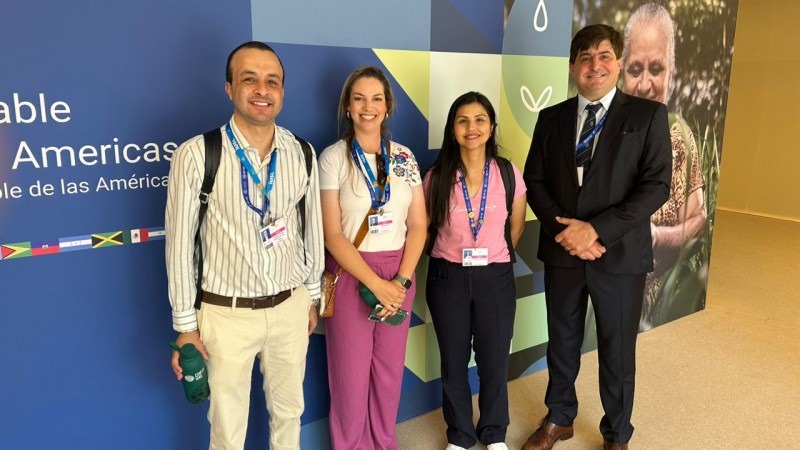The Secretariat of Agriculture of Rio Grande do Sul, Brazil; the state’s rice development authority and IICA submit a project to the Green Climate Fund at COP28, seeking to reduce rice emissions.

Dubai, United Arab Emirates, 6 December 2023 (IICA) – The Secretariat of Agriculture, Livestock, Sustainable Production and Irrigation (SEAPI) of the state of Rio Grande do Sul; the state’s public authority for the rice industry (IRGA) and the Inter-American Institute for Cooperation on Agriculture (IICA) presented a project to the Green Climate Fund (GCF), aimed at funding research and activities to reduce greenhouse gas (GHG) emissions on rice plantations in Southern Brazil.
The representatives of the organizations held a meeting at the ongoing Climate Change Conference (COP28) in Dubai that will continue until 12 December.
Mara Grohs, researcher at IRGA, explained that, “We intend to use the funds to develop and transfer practices to reduce greenhouse gas emissions in lowland production systems, making agricultural production in the southern half of the state more resistant to climate change”.
The Rice Institute of Rio Grande do Sul (IRGA) is an autonomous public authority in the state that falls under the SEAPI, but maintains administrative, financial and budgetary independence. Its purpose is to promote the sustainable development of the rice sector in Rio Grande do Sul, by generating and disseminating knowledge, information and technologies, as well as proposing policies to benefit the sector and consumers.
The hope is that the Green Climate Fund will respond to the proposal within a year.
The Rice Concept Note, the document supporting the request for funds, was prepared by IRGA and technical staff from IICA, with the approval of the Ministry of Agriculture and Livestock of Brazil (MAPA). The GCF was asked to invest 30 million dollars in the initiative, alongside the counterpart contribution of 20 million dollars from IRGA, for a total sum of 50 million dollars.
Gabriel Delgado, IICA Representative in Brazil, remarked that, “The Rio Grande do Sul system is efficient from a production and environmental perspective. It can serve as an example to other countries and other areas in Brazil on how to produce sustainably and profitably. The focus of the project is to expand sustainability actions within the state”.
Grohs confirmed that, “The project will have a direct impact on 6,639 beneficiaries and will benefit 37,000 individuals indirectly. It is estimated that each year it will facilitate the reduction of 3.4 tons of CO2 equivalent emissions per hectare of rice cultivated in rotation with soybeans”.
If approved, the funds will be allocated for rural extension and technical assistance services to equip farmers in lowland production systems to adopt practices to reduce GHG emissions and improve water use efficiency.
They will also be used to fund irrigation and drainage projects, as well as to purchase equipment to improve the management of production areas.
The Brazilian researcher also indicated that, “The funds will be invested in research to identify genotypes within the IRGA gene bank that produce fewer emissions. Already, sixty-five percent of the land area under rice cultivation during the last harvest utilized material from the Institute”.
Recent IRGA studies have shown that the irrigated rice cultivation system practiced in Rio Grande do Sul significantly contributes to the reduction of GHGs, especially methane. This reduction is due to the adoption of a system that rotates rainfed crops, such as soybean, which currently occupies 70% of the low-lying areas.
Jackson Brilhante, Coordinator of the Management Committee of the Low Carbon Agriculture Plan in Rio Grande do Sul (Plano ABC+RS for its acronym in Portuguese), indicated that, “This practice is one of the prerequisites mentioned in Brazil’s ABC+ Plan. Rio Grande do Sul was the third state in the country to define the targets it hopes to achieve under the plan up to 2030”.
He maintained that, “This is an important project that will contribute to GHG emission reduction in the agriculture sector, without undermining the productivity of the grains or the profitability of farmers”.
Brazil has committed to reducing methane emissions in the country 30% by 2030. In closing, Brilhante stated that, “Rice production in Rio Grande do Sul can help the country to meet this objective”.
Among the GHG mitigation practices adopted in irrigated rice production in the state are the rotation of the crop with soybeans and maize; early preparation of the soil or direct tilling; subsequent cultivation of winter crops; early and late irrigation; and the adoption of cultivars that demonstrate high production potential, such as IRGA 424RI.
The state of Rio Grande do Sul is the largest rice producer among the 26 political divisions of the Brazilian federation and the federal district of the country.
More information:
Institutional Communication Division.
comunicacion.institucional@iica.int